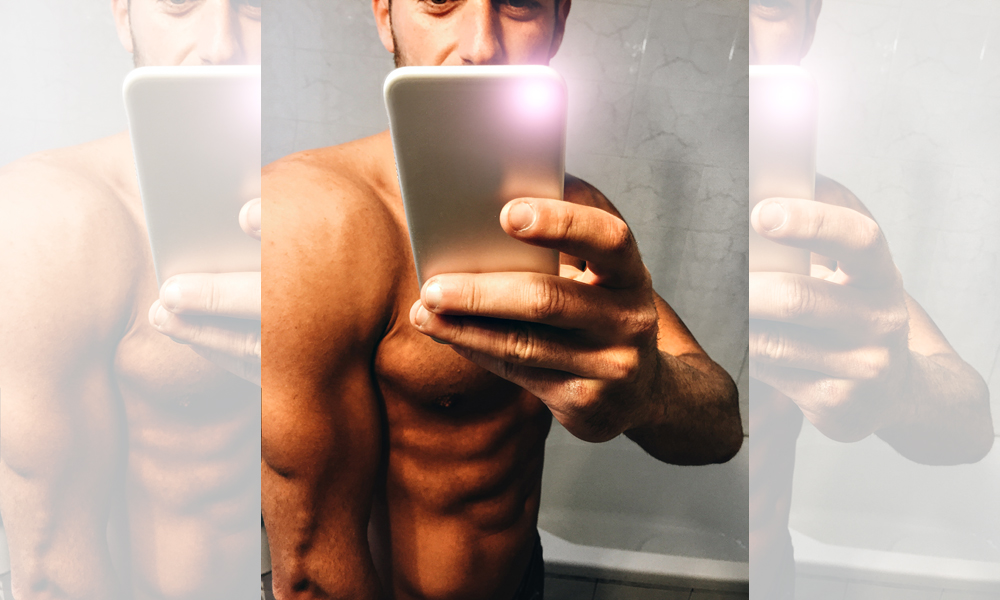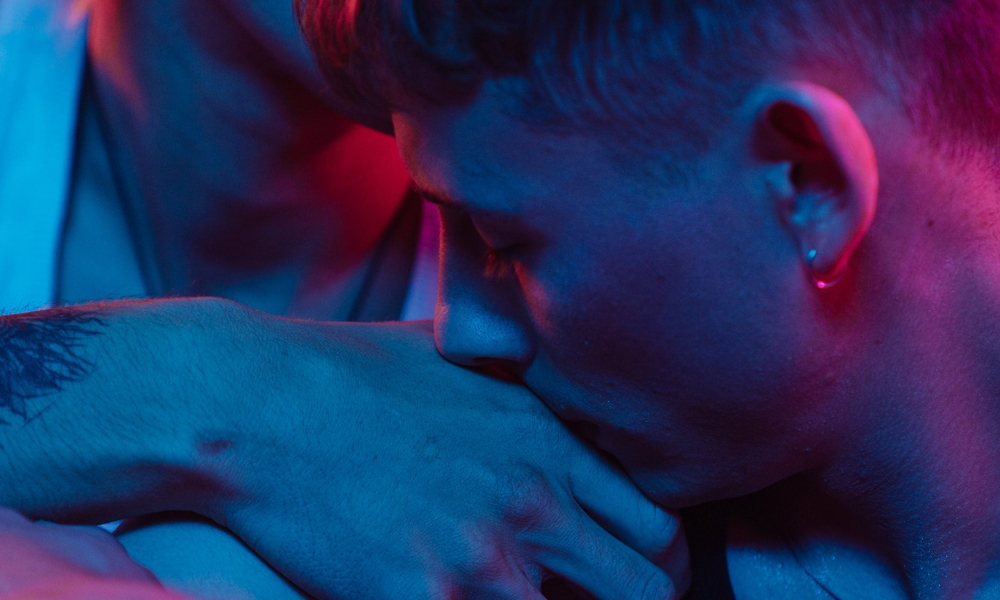There’s certainly something beautiful about the shamelessness of Instagays…
Adults used to warn their children, “If you don’t have anything nice to say, don’t say anything at all.” (Drag queens, of course, advise: “If you don’t have anything nice to say, come sit by me.”)
But these days, it seems, the rule is: “If you don’t have something either arousing or outrage-inducing to put out there, you’re not trying hard enough.”
As a species we are increasingly living our lives online, and to stand out – to even exist, really – we are obliged to create attention-getting social-media fodder. Humans are status-seeking animals, and the digital realm has given us unlimited opportunities to build alliances and attract fawning fans. In the LGBT community, these urges are most visible in two seemingly unrelated trends: those who live in perpetual thirst, like the sexy shirtless Instagays, and those who live in a cloud of perpetual outrage, like the valiant social justice warriors. But they’re really two sides of the same coin.
My favourite Instagay regularly posts nearly naked photos of himself, often with his junk strategically hidden behind a towel, book or well-placed leg. “No, gentlemen, I do not plan to post photos showing my dick,” he wrote when he launched his Twitter feed. “If you are here waiting for that, you are wasting your time.” That’s the kinda tease that makes followers check hourly. More skin inevitably equals more likes. Take, for example, Justin and Nick (@justinickpgh), a marvellously hunky gay couple living in Virginia, with an Instagram following of more than 567,000. Though their photos are always sexy and styled to the max, the shots of them wearing only underwear substantially out-like the shots of them partly undressed or, heaven forbid, fully clothed. Justin and Nick together undressed in bed: guaranteed 52K. Justin and Nick outdoors in their clothes: 33K at best. Yes, we’re that shallow.
There’s certainly something beautiful about the shamelessness of Instagays. They can be their “best” selves in a world where LGBT people must often hide or fake their way through life. But it can also be a trap, not only in constantly needing the validation of likes and retweets – outsourcing one’s self-esteem to others is never healthy – but by ultimately turning into another kind of fake.
“By choosing and controlling what is to be shown to others, [Instagrammers] can eliminate all the negative aspects of their lives and persons, and solemnly focus on what is positive,” write Caroline Garsbo and Emilia Sörensson Wittberger in a 2014 paper out of Sweden’s Lund School of Economics and Management. “However, as things have progressed, this identity is moving into their everyday lives. The main reason why you go to a glamorous event is not for the personal satisfaction anymore, it is to share a photograph of the event on Instagram to enhance your identity.… [In real life] their identity is not as easily controlled, forcing them to either change their behaviour in real life to fit their created identity or to close themselves off from the world in fear of showing their genuine self.”
It’s not just the Instagays who are having their lives reconfigured by social media. Followers consume these delicious images as we might consume porn or a bag of chips – short-lived pleasures that, whether we realize it or not, alter our perceptions of ourselves and the world. Earlier this year, Snapchat users were upset when the app separated friend streams from celebrity streams. CEO Evan Spiegel caused even more outrage when he declared: “People are saying, ‘I used to feel like this celebrity was my friend and now they’re not my friend anymore.’ Exactly. They’re not your friend.” When we mix the elite group of Instagays, who live their lives for the camera, with our own existence, we are apt to feel inferior – or submit ourselves to the same regimes.
Putting a more unfiltered version of yourself online has risks. On Reddit.com/r/lgbt, there’s a trend of young trans/non-binary people posting selfies with some version of “Do I pass, do I look good?” Most Redditers are kind enough to respond with something like: “You’re beautiful as you are; passing doesn’t matter.” But one gets the feeling that advice on hair length and makeup has more impact, as if the online world has the right and the capacity to dictate what each of us should be.
On the surface, sharing opinions on social media seems like a less narcissistic way to gain status and a sense of belonging. But I fear that people are posting to activate the designed-to-be-rewarding social-media feedback loop, rather than seeing both side of an argument and offering up a more nuanced, more personal point of view. We post what gets attention – any kind of attention – rather than the truly complex feelings most of us are saddled with.
Both the left and the right become caught up in “virtue signalling,” where prefab opinions are used to quickly categorize and denounce a person, institution or event (That’s an attack on our rights! That’s socialist! That’s an insult!) rather than exploring causes and solutions. Donald Trump’s an outrage, Doug Ford’s an outrage, a Conservative campaign poster in the gay village is an outrage, the police are an outrage, the protesters against the police are an outrage, what you posted about it on my Timeline is an outrage…and so on. Constant indignation makes for a one-note echo chamber, where humour – once the most reliable and effective weapon wielded by LGBT people – has a hard time flourishing. We’ve all become soccer players wailing on the field after taking a dive. This might account for the resurgence in the popularity of drag queens, who have no virtue to signal.
These days we can learn about all corners of our world in a way we never could before and, surprise, it’s a world full of problems. But living in endless distress about those problems – with our feelings deepened by social-media commiserating – gets in the way of creative responses. We’re too anxious and scattered to do anything useful.
Studies have shown that emotions are contagious, even online, meaning that people who read negative content are more likely to post negative content, drawing a self-perpetuating dark cloud over our connected world. So then we must turn to beautiful pictures of (supposedly) perfect people living perfect lives to distract us from the virus of perpetual outrage.
Sounds like addiction to me. But, fortunately, the rehab is not as daunting as the Betty Ford Clinic. Put down your phone. Talk to people face to face. Be as promiscuous with in-person compliments as with likes. On issues you care about, set out your case politely, in your own words. Don’t troll and don’t fall for trolling. There are times when anger is more useful than charm. Those times are rare.
—
PAUL GALLANT is a Toronto-based writer and editor who writes about travel, innovation, city building, social issues (particularly LGBT issues) and business for a variety of national and international publications. He’s done time as lead editor at the loop magazinein Vancouver as well as Xtraand fabin Toronto.

Thirst And Sanctimony On Social Media
Related Articles
Photo Gallery: The Enchanté Network’s National Black 2SLGBTQI+ Futures Summit
Highlights from Canada’s largest convening of Black 2SLGBTQI+ leaders and movement makers
Travel Your Way To Better Health
Take your love of travel and combine it with a wellness goal – these five types of personal improvement getaways will have you coming home a better you
IN Community: 5 Organizations Offering Support To People Experiencing Intimate Partner Violence
Here are five community resources from the IN Directory that can offer help to 2SLGBTQI+ communities





POST A COMMENT